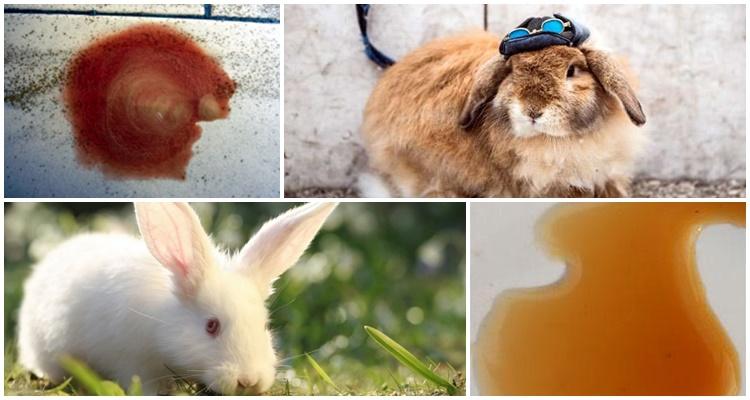Stress, taking antibiotics, poor diet, lack of fluid in the body - this is why a rabbit may have red urine. In addition to the above reasons, there are a number of other provoking factors. The appearance of blood in the urine is often a symptom of pathology - malignant neoplasms, kidney inflammation, polyps, etc. Treatment depends on the cause of the problem. However, it is better to prevent such symptoms by resorting to preventive measures.
What kind of urine should rabbits have?
To exclude possible problems with the health of the animal, you need to pay attention to the color of your pet’s urine.If the rabbit is healthy, the biological fluid will be straw-colored. In this case, the presence of a slight reddish tint is the norm. If the color change occurred after taking antibiotics or a change of environment, there is no need to worry about it. After 2-3 days the symptom should disappear.
Why do animals have red urine?
Red urine in a rabbit may be due to:
- Treatment with antibiotics.
- Excessive carotene content in foods (beets, carrots).
- The presence of pine needles in the pet's diet. The latter contains components that change the color of the discharge.
- Dehydration. Inadequate fluid intake causes urine to become concentrated and dark brown or reddish in color.
- Stress. A sudden change in the environment causes a negative reaction in the animal, as a result of which the discharge changes color.
- Urolithiasis. This condition makes urination difficult and painful. Since there are small solid particles in the urine and little liquid is released, the walls of the canals are damaged, and the rabbit pees blood.
- Pathologies of the genitourinary system. An infection that enters the animal’s body provokes internal bleeding, causing the discharge to become reddish.
- The appearance of tumors in the uterus.
- Injuries of the genitourinary system.
- Abortion.
Red urine in a rabbit during pregnancy – a dangerous symptom, if detected, it is necessary to urgently show the animal to a veterinarian. The presence of blood in the discharge can be a consequence of a miscarriage, as well as inflammation in the kidneys.
What should you do if detected?
If the urine has a uniform reddish color, you need to find out whether it is blood or something else.To do this, you need to test using hydrogen peroxide. To do this, you need to add a small amount of solution to the urine and analyze the result. If the liquid hisses and foams, it means it contains blood. In the absence of such a reaction, it can be argued that the urine is colored with carotene.
If a rabbit is found to have kidney or bladder stones, the doctor will prescribe the following medications:
- antispasmodics;
- painkillers;
- preparations that dissolve stones;
- antibiotics;
- means to increase the acidity of urine.
If there is a blockage of the urethra, urgent surgery is performed to remove the stone. If inflammatory processes are present, the veterinarian will prescribe a course of antibiotics. As a supplement to the main treatment, you can use folk remedies, for example, decoctions of plantain and tansy. This method is unacceptable if red spots or clots are found in the urine. In this case, urgent veterinary care is required, including surgery.
Prevention
To prevent the appearance of blood in the urine, it is necessary to monitor the health of the urinary system, as well as the reproductive organs of the animal. The following rules should be followed:
- Follow your diet, exclude grains and other prohibited foods from the daily menu. Food must be fresh and of high quality.
- Make sure that the rabbit does not suffer from dehydration (it should always have access to clean water).
- Filter the water.
- Make sure that the rabbit receives a sufficient amount of beneficial microelements in its food, especially vitamin C.
- Do not allow excess calcium into the animal's body.
- The room where the rabbit is located must be protected from drafts. Regardless of the time of year, the animal should not be exposed to overheating or hypothermia.
- Try not to expose the animal to stress.
- Carry out regular cleaning of the room in which the rabbit is kept.
- Provide your pet with dry, warm and soft bedding in the winter.
- Get routine vaccinations.
- Regularly deworm animals.
- If health problems have previously been identified, you must undergo a urine test regularly (at least once every three months).
Red urine in rabbits can be a symptom of a serious illness or indicate the animal's diet. Depending on the identified cause, treatment is prescribed (if necessary). To prevent the occurrence of similar signs in the future, it is necessary to follow preventive measures.
















